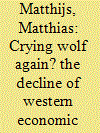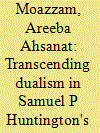| Srl | Item |
| 1 |
ID:
114939


|
|
|
|
|
| Publication |
2012.
|
| Summary/Abstract |
Since the turn of the millennium, scholars and pundits have been musing over the decline of the West. The disappointing US military invasions in Afghanistan and Iraq, together with the subprime mortgage crisis, seem to be evidence of an abrupt end to America's 'unipolar' moment. In Europe, the sovereign debt crisis has amplified Europe's long-term structural economic problems and laid bare the fragile institutional foundation on which the Economic and Monetary Union was built. At the same time, the BRICs and other emerging economies have been growing at unprecedented rates. Those same analysts see a 'decoupling' in the world economy: the developing economies pulling the world out of recession, while the advanced industrial economies are unable to solve their domestic difficulties. So to them, the events of the past five years signify the beginning of the end of Western influence, eventually leading to a more complete rebalancing of the world economy's current 'Western' system of governance. This article argues instead that the West still has a significant edge when it comes to most critical factors that determine long-term economic growth potential, including technology, innovative capacity, research and development, investment climate and education. Furthermore, the transatlantic economy is less vulnerable than the rest of the world to outside economic shocks and might eventually prove more capable of reform than many expect. The current malaise in the transatlantic community might therefore prove once again to be more cyclical than structural. Relying on linear projections, many are 'crying wolf' again, too loud and too soon.
|
|
|
|
|
|
|
|
|
|
|
|
|
|
|
|
| 2 |
ID:
151203


|
|
|
|
|
| Summary/Abstract |
Glorification of ‘self’ (Western civilisation) at the expense of the ‘other’ (eight civilisations) was inherent in Huntington’s Clash of Civilizations thesis. The ‘other’ civilisations identified—as the non-self and situated mostly in the Global South—were clubbed together as the Rest, irrespective of their pluralism. Building on Huntington’s binaries—the West and the Rest—this article makes an attempt to reflect on similarities within the perceived differences. Even though his civilisations appear different, they are in many ways similar due to interactions, colonisation and globalisation. Their relationship has become complicated; Western civilisation cannot do without civilisations from the Global South. Hence, there can be no perpetual or fixed enemy nor can all relationships be suspended with the ‘other’ in a globalising world.
|
|
|
|
|
|
|
|
|
|
|
|
|
|
|
|